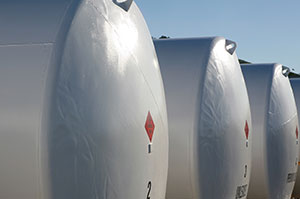
As consulting engineers, we are often asked about regulations pursuant to emergency generators. In Long Island’s Suffolk County, one does not have to register the generator itself, but its fuel source is another story: fuel storage systems must be registered and/or permitted. In most commercial applications, the fuel source will either be natural gas, diesel fuel or a combination thereof. Because natural gas is supplied via pipeline, permits are not required. But diesel fuel, when stored in tanks, does require permits and is subject to regulations.
In Suffolk, Article 12 of the Suffolk County Sanitary Code requires hazardous materials storage tanks, such as diesel tanks, to be registered and permitted with the Department of Health Services Bureau of Environmental Engineering. (This regulation affects both under and aboveground tank systems. Be aware that tanks supplying fuel for temporary power generation only have to be registered if the individual or combined volume of fuel being stored on-site exceeds 1,100 gallons.) The purpose of regulation is to allow the county to maintain an inventory of hazardous materials storage sites throughout the county that could contaminate groundwater.
To obtain a permit, an application packet, including a full set of drawings showing the proposed tank’s construction, must be submitted to the county. Drawings must be prepared, sealed and signed by a registered professional engineer or architect licensed in New York State. Once approved, the applicant will receive a letter authorizing construction, and will have one year to complete installation.
Periodic construction inspections will be performed by the Department of Health Services inspectors as the work proceeds. After a satisfactory final inspection, a permit to operate is issued. An operating permit grants permission to maintain a storage facility for toxic and hazardous materials, i.e. the tank. This permit must be renewed annually. The permit fee is a function of the total volume of storage.
Once you have obtained your operating permit, you are legally allowed to maintain the tank and, in so doing, operate your generator.
NOTE: Some villages and towns within Suffolk County require additional building permits and zoning setback requirements for generators, so be sure to check with your local municipality before proceeding.
Stay warm; keep the lights on and the doors open. If Walden can be of service, please do not hesitate to give us a call.
